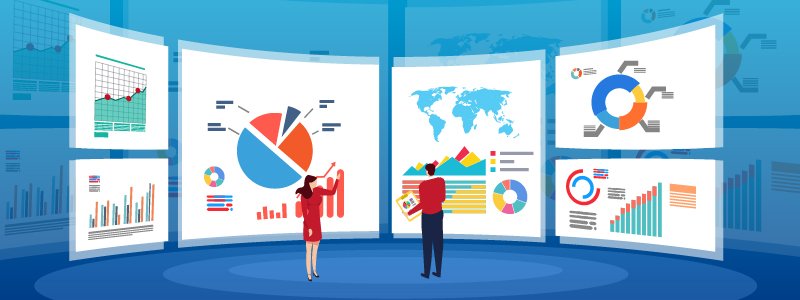Most businesses are aware of the value of data — but how much is the data your organization collects worth, and how can it be monetized?
Businesses of all sizes are beginning to recognise the value of data. The growing ubiquity of digital technology in all business processes provides companies with the opportunity to collect a large volume of data — but determining the value of the data your business collects or how to monetize it can be difficult.
Successful data-driven organizations typically define the value of the data they collect based on the applications and use cases presented by data itself. Using traditional accounting frameworks to define value collected data is problematic — VC firms, board members, financial analysts, and board members expect data-driven startups and business to define the vale of data assets based on opportunity, bottom-line improvement, top-line growth, and risk-of-loss.
Whether you’re currently composing an investor deck, assessing business assets for insurance purposes, or creating a financial forecast, determining the value of your data assets is essential. How can you calculate how much your data is worth, and how can it be monetized?
Determining the Value of Your Data
There are a number of different models that can be used to determine the value of the data your business collects. The value of data can be determined based on the cost incurred by replacing it should it be lost, or via an assessment of the revenue it generates.
Other value assessments take into account the income that could be generated by selling or renting data to third parties. Assessing the value of data based on these factors relies heavily on access to analytics tools, which can be prohibitively expensive for new startups or growing businesses.
Risk of loss valuation is a valid method of determining the value of data to your business without in-depth analytics tools. IBM’s 2019 Cost of a Data Breach Report reveals that the average data breach costs businesses $3.92 million, with the cost of each individual compromised record valued at over $150.
Determining the value of data based on the costs incurred should you lost access to it or in the event of a data breach provides insight into the overall value of data to your business. Risk of loss factors that can be considered include opportunity cost, regulatory fines or settlement values, or the potential coverage limit on cyber security insurance.
- There are several key metrics that can be used to calculate the value of your data, which include:
- Data type: What kind of data does your business collect? Is your business able to remarket data or anonymize it if necessary?
- Coverage: Does your data cover a broad region of a specific market? Can your data be used to create market-wide analyses?
- Recency: How “fresh” is your data? Is your data generated on an hourly, daily, weekly, monthly basis, or is it generated in batches? More recent data is more valuable.
- Resolution: How detailed is your data? The amount of data points present within your data is not as important as the detail and relevancy of the data points themselves.
- Accuracy: How accurate and reliable is your data? Valuable data is validated in order to ensure accuracy.
- Geography: Does your data cover a single geographic region, or is is collected worldwide? Geographic factors can influence the value of your data.
Monetizing Your Company’s Data
Assessing the potential ways in which your company can monetize the data it collects is another effective method of determining its value. McKinsey’s 2018 Analytics Comes of Age study predicts that big data market revenues will increase from $42B to $102B annually over the next decade, demonstrating the growing importance of data monetization.
Data monetization can be divided into two broad categories: internal applications, which increase efficiencies, improve automation and customer success outcomes; and external applications, which leverage data in order to create new income streams or improve marketing and sales.
Direct Monetization
Direct monetization is often one of the first methods considered by business leaders interested in capitalizing on the value of company data. In most cases, direct monetization involves the sale of data sets or access to business data as a service.
Businesses that leverage the value of the data they collect though data-as-a-service models typically collect data, analyze it, and then monetize it. This process relies on an understanding of the market’s perception of data value, incorporating an assessment of how similar businesses market and price their data services.
Direct data monetization has no clearly defined valuation process, but can be achieved though indirect methods. Businesses seeking labeled training data for deep learning applications, for example, may consult with a data annotation platform such as Figure Eight in order to assess the price of similar data sets. Startups that are valued highly due to the data they collect are also effective benchmarks that can be used to assess the value of business data.
Direct comparison between your business data and other business however necessitates the development of a comparison process that takes into account the key differences between both organizations. Differing business models, audiences, and data volume can often obfuscate the real-world value of data.
Monetization Through Automation
Data doesn’t have to be monetized directly — it can also be leveraged internally in order to automate time-intensive processes that incur human capital costs. Many repetitive tasks can now be automated using chatbots, artificial intelligence platforms, and robotic process automation.
Cloud-based accounting platforms such as Xero, for example, can be used with a broad range of third-party applications that autonomously collect and organize financial data in order to minimize the amount of time that must be spent on manual data entry.
By freeing up employee time by incorporating automated solutions that leverage existing data, businesses are able to direct employees toward higher-value tasks.
Derivative Opportunity Monetization
Data can be monetized by creating entirely new opportunities or business models by combining external data with the data collected by your business. An agri-food company, for example, may combine external weather data based on geological region with data on prevalent weeds and pests within those regions.
This external data can then be combined with the core seed data collected by the company in order to determine the most cost-effective pesticide strategy and optimize crops on a geographic basis. The derivative opportunity presented by data in this case demonstrates the importance of leveraging both internal and external data in order to optimize existing business processes.
The value of derivative monetization can be clarified by performing an A/B test, assessing benefit of new business practices introduced before and after the incorporation of external data.
Algorithmic Value Modeling
Algorithmic data is essential to the recommendation engines used by large-scale organizations such as Amazon and Netflix. Amazon, for example tracks the behavior of platform users in order to provide user-specific recommendations based on their own purchase history and the purchase history of users with similar habits.
Netflix leverages the data it collects in order to provide users with content that matches their personal preferences, increasing revenue and customer retention. Recommendation engines aren’t the only application of algorithmic data, however — artificial intelligence platforms are able to assist with the execution of data-intensive processes such as finance applications or insurance claims, automating time-intensive tasks and providing users with faster response times.
Key Takeaways
There is no single model or equation that can be used to value the data your company collects. Data valuation is a complex process that incorporates factors such as accessibility, usability, accuracy, and recency. The fundamental element of any data valuation are the potential benefits any application of data brings to your business, and how these benefits translate into cost reduction or increased profitability.
Business leaders seeking to determine the value of data should consider the potential value of any new processes, products, services, business models, or revenue streams that could be created by leveraging existing data, as well as the potential costs incurred by any data breach or loss.
Data is an important asset that should not be overlooked when performing detailed value analysis of your business. If you’re currently seeking assistance with determining the value of your business or the data it collection, reach out to Fullstack today.
Was this article helpful?
Related Posts
- How to Incorporate a Company in Australia
Incorporating a company requires careful planning. This article provides a step-by-step guide on how to…
- How to Deregister a Company in Australia
You may find that you want to deregister a company in Australia, but how does…
- Company Constitution: Do You Need One?
Company constitutions in many ways represent the company rulebook. They set out how the company…
- Company Constitution: Do You Need One?
Company constitutions in many ways represent the company rulebook. They set out how the company…
















